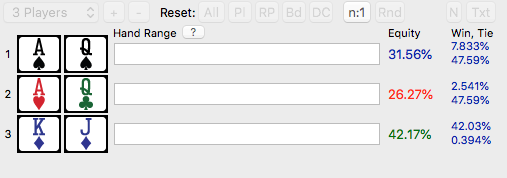Debi
Forum Admin
Administrator
Decision making when you are in position in tournaments is vitally important - but maybe a bit easier than some decisions you might have to make when out of position. I think that is where most new players struggle the most -playing too many hands out of position.
Read this article and share your thoughts on it and on how you play when out of position:
Playing out of Position in MTT's
On the other hand - some players might play way too tight out of position - literally folding almost every hand regardless of chip stacks and other important information that needs to be considered.
Read this article and share your thoughts on it and on how you play when out of position:
Playing out of Position in MTT's
On the other hand - some players might play way too tight out of position - literally folding almost every hand regardless of chip stacks and other important information that needs to be considered.



















